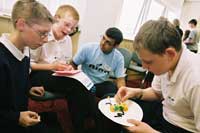Promoting science and motivating students in the 21st century Teach article
Marilyn Brodie from the Centre for Science Education, UK, describes two projects to involve the scientific research community in schools and raise enthusiasm for science among students.

working with school students
When science is taught out of context and seems irrelevant to their lives, many students lose interest. And if a student’s own motivation is disregarded, even the most careful preparation on the part of the teacher will be wasted. It is crucial, therefore, to highlight the importance of science and its relevance to students’ lives. Students also need more positive and realistic demonstrations of the scope and limitations of science and scientists. Both of these challenges can be addressed by mobilising the scientific and engineering research community.
Some underpinning research
The UK has a long tradition of educating and training scientists, engineers and mathematicians who have contributed greatly to the economic stability of the nation. However, even though more young people are entering higher education, fewer students are choosing mathematics, physics and chemistry (HESA, 2005), resulting in a skills shortage. The key to reversing this trend is to inspire and enthuse young people in science and engineering throughout their school education. Mathematics and the physical sciences, however, lack positive role models and effective careers advice for aspiring students (Roberts, 2002; Rasekoala, 2001).
A survey of 50 schools across the UK showed that although most students enjoyed learning science at school, few wanted to study science after school (Bevins et al., 2005). Physics in particular was seen as complex and difficult.
“[Physics] is too hard. There are too many laws and stuff. It doesn’t really matter anyway. I will never need that type of stuff when I start work. You only need to know it if you want to do physics as a job.”
13-year-old student
Students recognised that access to practising scientists and engineers would increase their interest and enthusiasm, as well as provide valuable information on careers and studies. They also felt that an expert in the classroom would help to put the subject into context and make classroom activities more exciting.
“When we’re doing things like gases, if an expert is in school to help us they could show us why we use gases and how they use them in their jobs – that would make [the concept] really interesting.”
14-year-old student
“It would be good to ask them questions about their jobs and find out what they do, how they do it and how they learned to do it – how much they get paid.”
13-year-old student
Students also suggested that school visits by professionals and to their workplaces would help them to learn about and understand specific professions.
“It would be good to visit a university to see what they do. It would be exciting.”
12-year-old student
Both the Researchers in Residence project and the Express Yourself conferences expose students to practising scientists and engineers, developing the students’ images of scientists and engineers, as well as of the fields of science and engineering.
Researchers in Residence
Researchers in Residence is a project to bring some of the most creative research talents in the UK into secondary schools. The chosen researchers are fiercely passionate about their subject and their enthusiasm can ignite a fresh interest for science among young people.
PhD students and post-doctoral researchers in science, technology, engineering and mathematics volunteer to spend four to five days in secondary schools. They may give classroom support or presentations, arrange visits or attend field trips. After the initial placement, many researchers continue their involvement with the schools (Brodie & Hudson, 1995).
Among the reasons given by researchers for their involvement are the opportunities to: act as a positive role model (~40% are female); demystify research; improve the image of scientists; and pass on enthusiasm for science, technology, engineering and mathematics. Furthermore, the researchers may benefit by improving their communication skills, investigating the world of education and teaching, enhancing their CV – or simply by taking a break from their normal routine.
“Working with school children and knowing that there is a lot of upcoming talent”
“I think the programme is a welcome return to the ‘real world’ and helps put research in perspective. You have a different view of your thesis topic once you have had to explain it to young people and relate it to the subjects studied and skills learned at secondary school.”
Two PhD students
The project is funded by the Research Councils UK and the Wellcome Trust, and managed by the Centre for Science Education (see box). Since it began in 1995, the Researchers in Residence project has recruited, trained and placed around 3500 researchers in over 2000 schools, working with about 2000 teachers and 300 000 students.
Express Yourself conferences

the Royal Institution, London
Celebrating science and the achievements of school students not only helps to promote science but also can be highly motivating for the students involved.
The Express Yourself conferences are linked to the Researchers in Residence project. Hosted by research scientists, these conferences give school students a forum in which to present the findings of their own science investigations. The conferences are run similarly to real research conferences, with opportunities for students to:
- Communicate and share their ideas with other students, teachers and researchers
- Present research papers in seminars chaired by researchers in residence
- Present and host displays of their investigations
- Participate in other activities, such as discussing their work with experienced researchers, attending keynote lectures and demonstrations, and participating in practical workshops.
Summary
Science teachers and the scientific community have an important role in promoting science and raising its profile with young people, particularly by increasing student participation, motivation and success. This can be encouraged by mobilising professional scientists and engineers to support school science and by celebrating students’ achievements in science.
The Centre for Science Education
The Centre for Science Education is one of the UK’s foremost groups in science education research and development, and is the largest academic group in the field in Europe. Its wide portfolio includes continuing professional development, the creation of motivating and innovative intervention schemes, and curriculum development in both print and digital media.
The Centre for Science Education is committed to reversing the trend away from science careers and qualifications by inspiring and capturing the imagination of young people in science through the development of ‘creativity-rich’ resources and activities.
Help is at hand
If you are interested in setting up a similar scheme in your own country and would like advice, the Researchers in Residence team would be happy to help. Contact Marilyn Brodie (M.M.Brodie@shu.ac.uk).
References
- Bevins S, Brodie E, Brodie M (2005) UK Secondary School Pupils’ Perceptions of Science & Engineering. A report for the Engineering & Physical Sciences Research Council & the Particle Physics & Astronomy Research Council (unpublished). Available on request: M.M.Brodie@shu.ac.uk
- Brodie M, Hudson T (1995) Pupil Researcher Initiative: Researchers in Residence. Education in Science 165: 18-19
- HESA (2005) Qualifications Obtained by, and Examination Results of, Higher Education Students at Higher Education Institutions in the United Kingdom for the Academic Year 2003/04. SFR PR82. Cheltenham, UK: Higher Education Statistics Agency
- Rasekoala E (2001) African-Caribbean Representation in Science & Technology (ACRISAT). London, UK: National Endowment for Science, Technology and the Arts
- Roberts G (2002) SET for Success: The Supply of People with Science, Technology, Engineering and Mathematical Skills. London, UK: Her Majesty’s Stationery Office
Resources
- Research Councils UK is a strategic partnership of seven UK research councils championing science, engineering and technology
- The Wellcome Trust is the world’s largest medical research charity funding research into human and animal health
- More information on Researchers in Residence
- More information on Express Yourself conferences
Review
Many countries in Europe struggle to overcome the falling interest in university science studies. This article describes two innovative projects to provide students with a positive and realistic image of science. Bringing researchers into secondary schools motivates students by providing them with role models and a genuine picture of research. For example, communicating ideas and results at conferences is an essential part of scientific research – but one that is habitually overlooked when explaining to students what research actually involves.
The initiatives presented in this article are useful for science teachers who want to enhance their students’ motivation for science, either by inviting researchers to visit their schools or by organising student science conferences. Both projects provide science teachers with ideas that can be incorporated into classroom activities and in schools.
Organising such events is time-consuming, but unquestionably worthwhile. Cooperation across science subjects might give an even more complete image of scientific research. Ask researchers at your local university to participate in these projects – they too will benefit.
Roeland van der Rijst, the Netherlands





